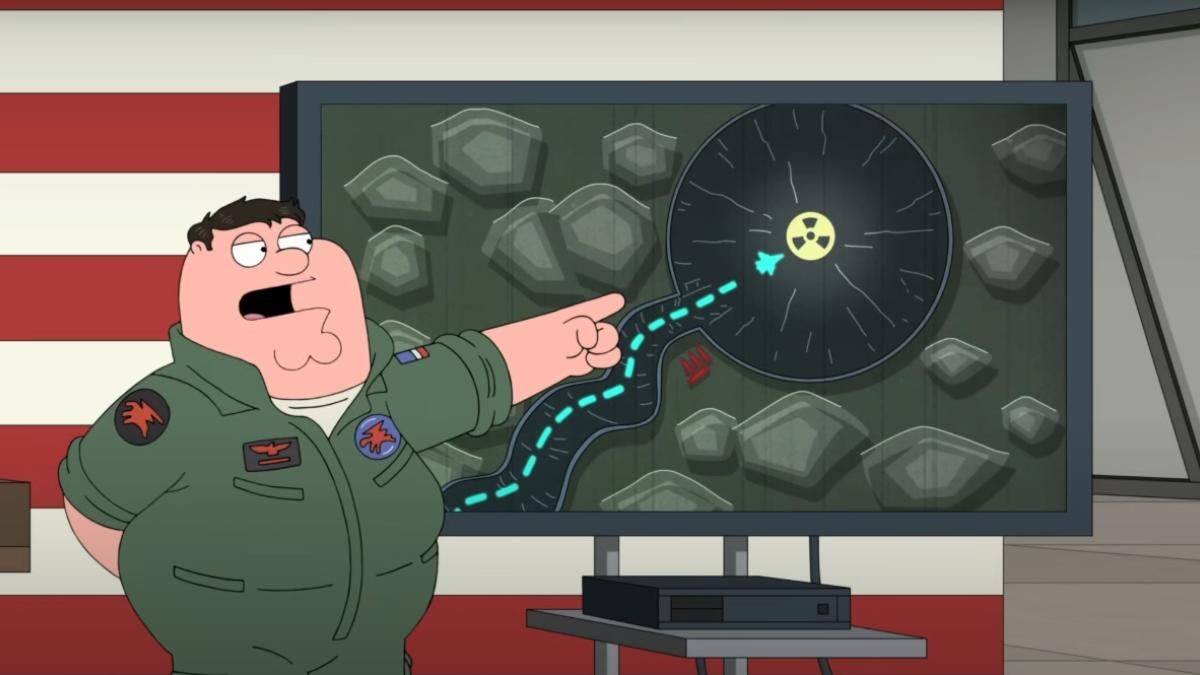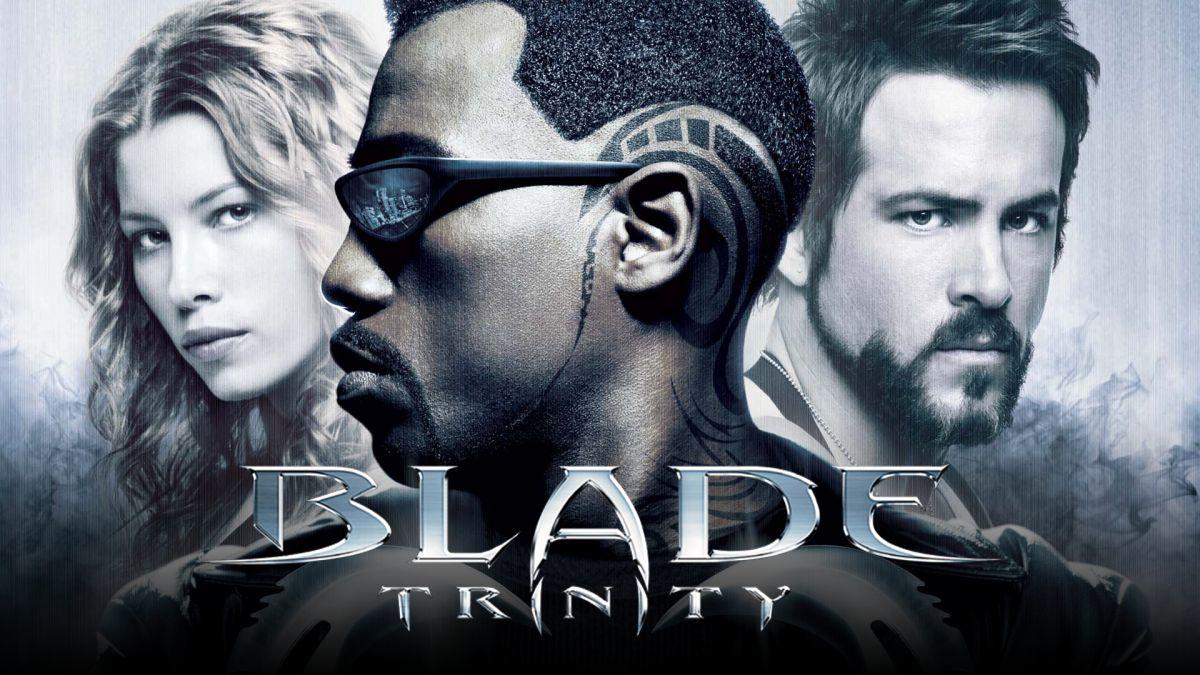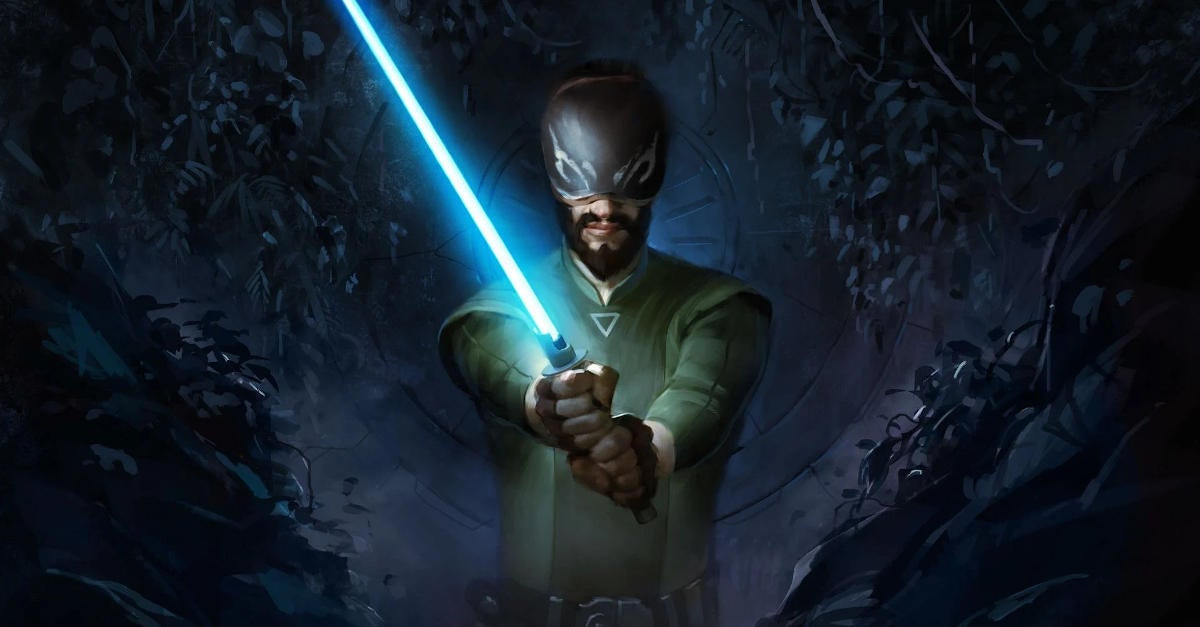Star Trek: Strange New Worlds' Bruce Horak Introduces Hemmer, the Enterpirse's New Chief Engineer
The USS Enterprise returned to duty last week in Star Trek: Strange New Worlds, the latest and highest-rated installment of the Star Trek franchise. Every Starship needs its chief engineer and Strange New Worlds' is Hemmer, played by Bruce Horak. Horak is a legally blind actor who is playing a member of the Aenar, a subspecies of Andorians that are blind, telepathic, and pacifistic. Hemmer's also a bit on the cranky side, as you can see in the clip from Stange New Worlds' second episode, "Children of the Comet," included above.
ComicBook.com had the opportunity to chat with Horak about bringing his lived experiences to the Star Trek universe as Hemmer. Here's what he had to say:

Jamie Lovett, ComicBook.com: What was your history with Star Trek before you came into this role? Did you have an understanding of what an Andorian and an Aenar were?
Bruce Horak: Oh, yeah. I started watching Star Trek when I was real little. We used to gather around the Horak television set and the family would all sit and watch the original series and reruns and just absolutely loved it. My dad was a big influence on that. He was an English teacher and a real sci-fi nut. He collected comic books ever since he was a little kid. I was immersed in that, and sci-fi was really his passion. He instilled that in me and in my brothers as well.
Definitely watched The Next Generation and got into the whole world, the whole canon of Star Trek. When the call went out they were looking for a blind or visually impaired performer to play a blind alien on a new Star Trek, it was kind of a no-brainer. I absolutely put my hat in the ring. Put me in coach, I'm ready. It was and is, it continues to be just a total thrill. This is such a dream to be helping to continue to build the canon that is the Star Trek lore, the universe.
It sounds like they were pretty upfront with you. What was the audition process like? Did they pretty much give you Hemmer as is when you auditioned?
The scene that I was given to audition with is the scene in episode two where Uhura meets Hemmer for the first time and offers to help him, and he sort of snaps at her about his abilities and impairments, humans might consider themselves impaired and all of that. That was the scene that I was given: cooking, and at the end of the scene, I was supposed to throw a carrot up and catch it in my mouth to demonstrate my skills. That was changed to having Spock throw it and me catch it, which I think is actually a much better demonstration of his incredible powers.
That much I knew. I knew that he was an Aenar, so I dug into the two episodes in Enterprise, I went and watched that, and then I dug into Memory Alpha to see, what do we know about them? There's not much known about the Aenar, so in a way that's like, oh, this is a big mystery about it, but it's also really exciting because everything is going to be building on the lore of it.
What else can I tell you that I knew? Not much. He's blind and he can see through incredible telepathy, so not really blind. It's the same issue that I have with calling Matt Murdock blind. He uses a cane, but he doesn't really need it, he's an acrobat. Calling him blind, it just seems like a bit of a misnomer. Well, maybe a misdirect if you will, but his eyes don't work in the traditional sense shall we say, but then neither do mine.
I can certainly relate in that respect. I use my hearing. I use my sense of touch and smell and all my other senses. I wouldn't say that they're superhuman, but it's like a muscle. I happen to use them in an unconventional way perhaps, or maybe I rely on them in getting around and navigating the world in a way that's different than say the standard mode, but there's nothing really about Hemmer that's standard mode, which is exciting.
How did you feel when you heard that they were looking for a visually impaired or blind actor to play this? Star Trek has a reputation for trying to show a progressive view of a better future, but this seems like taking things a step further than they have in the past.
Absolutely. And there's been a real shift I think certainly in the disability arts network and the disability arts community in putting that out there. I think it's really exciting. I've seen a few calls in casting looking for specifically blind or specifically disabled performers to do that, and what it is is giving an opportunity to be seen. Is that a pun? I don't know. But it is, it's opening the door and giving the opportunity for performers that wouldn't necessarily be considered before because we're being looked at for our lived experience. And it's not necessarily that I'm going to come out there and I'm going to play exactly my own impairment here, but I'm able to draw on my own lived experiences in order to help to build that character and that's really exciting.
I know growing up that when I saw an actor transform themselves -- and oftentimes it was a very able-bodied performer. The example I often use is Daniel Day-Lewis in My Left Foot. I mean, when I saw that movie, he played Christy Brown who was severely disabled, and I was convinced that that was Christy Brown. And then I saw Daniel Day-Lewis get an Academy Award and I'm like, "Wait a minute." And it inspired me because I'm like, "Well, yeah, you can transform. You can put yourself into another person's shoes and you can live in that skin and what an incredible gift." I can't imagine what Daniel Day-Lewis must have learned about the world of disability and living with that kind of impairment. (There is that word again.)
But I know, for myself, when I step into a role that isn't me, that is very much far outside of myself, I learn a lot about myself as well, and getting the opportunity to play Hemmer where the lived experience is similar, but he's so far beyond any of my own capabilities -- if Ethan Peck threw a carrot at me, I'd take it in the face, there's no way I would catch it unless we rehearsed it -- it's an incredible thing that they're doing with this character.
I feel so honored to be able to embody that, and I hope really that there are people with disabilities who will see that and say, "Yeah, there's some preconceptions that I can challenge." Maybe some of them are my own. Maybe they're internalized and I can push myself a little bit or I can challenge that and say, "Okay, maybe I can do this." Because the opportunities are starting to arise and hopefully they continue because I think it really connects with an audience that perhaps they hadn't connected with before, and it gives actors an opportunity to step into a world of empathy and compassion that performing, it's the best for that really.
Did you have any hesitation about taking on a role that requires three and a half hours of prosthetics? Was that something you were eager to experience or did you second guess it at all?
No. No second-guessing on that. I've done mask work before, I've done a little bit of prosthetics work, but nothing to this extent. Doing mask work is one of my favorite things. Really, you get to completely disappear. Costuming is one thing, but when the face is completely altered and when you know that you get the chance to physically embody another skin, it's really exciting. Three and a half hours in a makeup chair, yeah, it's extensive, but I was really lucky that I had two really great guys working on me That was Allan Cooke and Shane Zander, who are incredible technicians and we had a blast.
They're incredibly skilled. They're very careful. My eyes are very sensitive and they worked with that. We had a great time. We hit it off. We're nerds, so we nerded out for three and a half hours. And honestly, after two years in lockdown, it's like going to the spa. It's like, oh my god, people are touching me again, this is great.
As the ship's engineer, I imagine you have your fair share of technobabble to talk around. Was that a challenge at all or did your longtime immersion in the sci-fi genre help you with that?
I'd say a little bit, the history with the genre, for sure. I was familiar with nacelles and things like that, certainly, on the Enterprise. I've heard a lot of those words before. Wasn't much that was being thrown at me that I hadn't at least heard before. Saying some of the words and in the combinations that they were… but I also have a history or a background in Shakespeare. It's English, but it can be a confusing and complicated dance. Approaching the technobabble like it was a bit of Shakespeare actually really helped.
Is there something of yourself that you see in Hemmer? Or, alternatively, is there a part of Hemmer that you think really came out of specifically you playing him versus another actor?
He's very sure of himself and he is very confident. I'm not that, but there are moments when I am and I drew on that. I thought, well, I'm really my most confident when I'm behind a drum kit, and so I thought about that freedom and proficiency and I thought, yeah, that's an element of myself I can draw on. When I'm painting or when I'm playing music, then I'm confident and I'm comfortable and relaxed, and I feel like I know what I'm doing, so taking some of those bits.
He's got a very gentle inside. You've seen up to episode five, so you've seen the episode where they specifically talk about the Aenar and Starfleet, and he's a pacifist and that's something that I've tried to practice in my life. I really try to find alternatives to violence whenever I can. And that element I really connected with and he saw a different path for himself. Initially, he wanted to be, I think he said he wants to be a botanist and he really loves flora. And I'm like, "Oh yeah, that makes sense for this guy, dig in the dirt and you connect with things." And there's that element of him for sure that I really connected with.
It's about time to wrap up. Can you tell us anything about what to expect from Hemmer going forward, or what his arc might look like this season?
We'll get a taste of it in episode two. It's an introduction to Uhura and his relationship. He says right off the bat, "I really like her. I like this one," and I think that gets explored in this season, their relationship. In a lot of ways, the first couple of episodes have been about Uhura's journey. She's the fish out of water. She's the stranger who comes to town and she's finding her way in there. She admits right off the bat that Starfleet really wasn't her thing and she's not feeling that kind of passion or drive.
We get to watch the bonds form with Uhura and especially the bond between Uhura and Hemmer. It was a real gift to work on that, and certainly connecting with Celia [Rose Gooding] who has a background in theater as well, like I do. In theater, you're given such a short period of time to create a show, get it up on its feet, and put it in front of people, and that requires of the performers an ability to connect with each other and you build family fast, you really do.
And those connections, those bonds are lifelong. I mean, there are people I did shows with in college and they're still friends and we're still colleagues, and that's something that you can't deny. And I think something like Starfleet, where you're literally going through the trenches and when you feel like you've gone through the trenches with somebody, you're the band of brothers and I think that's what we see in this, particularly in the first season of Strange New Worlds.
New episodes of Star Trek: Strange New Worlds debut weekly on Thursdays on Paramount+.




